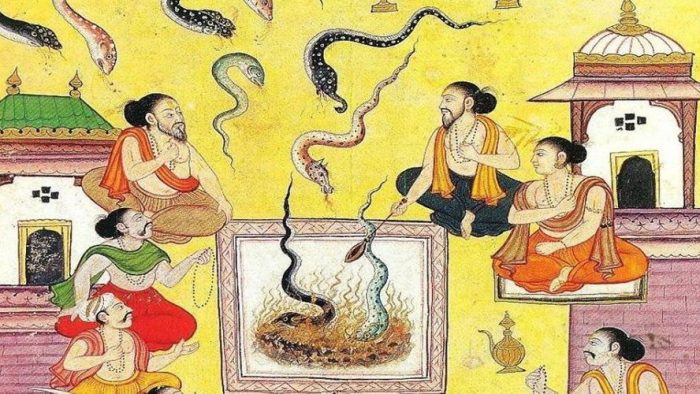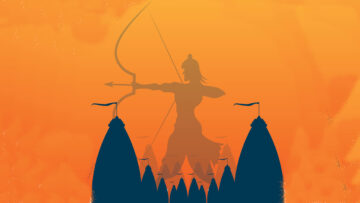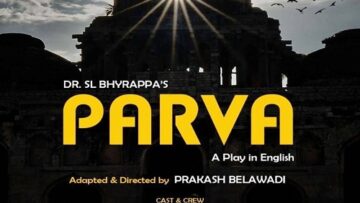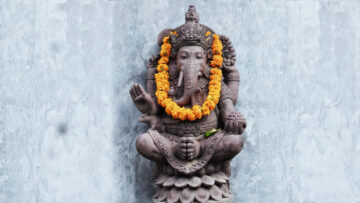The story of Astika, son of sage Jaratkaru and Jaratkaru – the sister of Vasuki, is upheld as a very auspicious one in the tradition. It marks the end of backdrop provided to in Adi Parva – before the lineage of the Kuru dynasty begins. Astika fulfills his destiny and brings a long conflict to a marked end. The importance of Astika is that he brings about a reconciliation between two divergent realities. He represents both the nature of reconciliation that is required and the kind of person that is required to achieve to achieve the same. Civilizations and cultures need Astika-s to achieve such reconciliation. It requires penance, righteousness, perspective, purity in heart and the locus standi of a purpose. In conflicts between divergent but creatively important realities, reconciliation requires long wait and striving hard for the shaping of the right man with right instruments in hand. Astika achieves through his compellingly divine words, for words become as powerful as mantra. They can take the form of a weapon or effect a change of heart.
King Janamejaya, son of King Pareekshit and grandson of Abhimanyu, learnt from Sage Uttanka that his father had been stung to death by the Sarpa Takshaka. He invited his trusted ministers to learn about the entire episode. While the great Tapaswi Shringi delivered a disproportionately harsh curse on Pareekshit, Janamejaya appreciated that it was against an insult by his father, even if that was a momentary slip of the mind. But Janamejaya was aghast that Takshaka deviously, through a bribe, stopped a Brahmana – Kashyapa who had the ability to cure any snake bite, from reaching the capital to save Pareekshit. Janamejaya laid the entire blame on Takshaka. He invited his ministers, priests for a discussion and sought advice from them on an appropriate course of action. In particular, he was keen to burn Takshaka into ashes, just as he burnt Pareekshit through his poison. The learned Rutvijas, called upon for advice, made a mention of the great Sarpa Satra that would bring the entire clan to destruction. They also reveal the destiny of Janamejaya – that he alone was divinely ordained to perform the Sarpa Satra. Encouraged by destiny revealed to him, Janamejaya at once ordered for the preparations to be made. The ministers and priests were already burning in anger at the loss of King Pareekshit and set themselves onto the task without any delay. The austere Rutvijas bestowed with divine powers created a Yagnashaala in absolute conformance to the need of the yagna. However, inspite of all preparations being made with necessary care, just before the yagna started they encountered enough signs of hurdles. There was a learned, experienced and intelligent sthapathi – who was building the yagnashaala. He met the king and alerted him. “Oh King, if I assess the place for yagna, the muhoorta and the design of the yagnashaala, I can see that the yagna is unlikely to be completed. It will be stopped before it meets a complete end by a Brahmana filled with a purpose – such are the signs that I see with my intuition”. Janamejaya, the thoughtful King at once called his soldiers and ordered them that none should allowed enter the arena until the yagna was absolutely performed meeting its purpose.
The grand Sarpa Satra began. As the Rutvijas chanted mantras and called upon a Sarpa by its name, it came falling into the yagna and burn into ashes. The Sarpas were filled with fear in their hearts. The yagnashaala was filled with the smoke of their burning. They moment the Rutvijas chanted ‘Svaahaa’ the hapless Sarpas would come falling into the fireplace of yagna, driven by a great power. They made desperate attempts to save themselves and let a fearful cry. They clung to each other hoping they would not fall into the yagna. But the power of Yagneshwara and the mantras was beyond them. The long, the short, the thick, the thin, the poisonous and the non-poisonous, the colourful and the colourless, the powerful and the hapless – all those that indulged in unrighteous and excessive use of their powers came falling into the yagna, thus fulfilling the curse of their Mother and the divine correction of Lord Brahma. In particular, Takshaka was trembling with fear. He was the reason for this Sarpa Satra and the primary target of the angst of King Janamejaya. The moment he learnt of Janamejaya taking the deeksha to perform Sarpa Satra, he ran to his friend Devendra – the lord of all Devas. Devendra, ever with a soft corner for his friend, Takshaka, who he had saved once in the burning of the Khandava forest, gave him shelter in his palace. He assured him that he would be safe in the palace and that he had a special request placed with Lord Brahma for this reason. Takshaka was relieved. He lost himself in the opulence of Indra’s palace and lived there in comfort.
On the other side, Vasuki was a much worried Sarpa. He saw in distress that his fraternity was being wiped doubt in uncountable numbers, burnt into ashes in the yagna. In a while, he thought, the entire clan would be wiped away and nothing would be left of them. His heart was filled with concern for his clan. Time had come for him to reach out to Jaratkaru – his sister. “Oh sister, all my organs are burning. I have lost a sense of direction. With each passing moment, I feel my strength is diminishing. My head is spinning. I may lose my consciousness soon. King Janamejaya has begun to perform Sarpa Saptra and the moment that we feared as a clan is coming true. If we do not do anything now, we are sure to lose all of us. Oh Sister – you alone are our savior. This is the moment when the very purpose of your marriage with Sage Jaratkaru should fulfill itself. Your son, Astika, alone can help us survive the fire that Janamejaya is letting loose in the world. You are aware that Lord Brahma has bestowed only Astika with the powers to stop this Yagna. Your son must now perform this great act of saving the clan of Sarpas. Hence, you must at once implore upon your learned son that he must protect his uncle and his entire clan”.
Jaratkaru ran to her son Astika. She narrated the curse of Kadru, Vasuki’s struggle to release the clan from the curse, Lord Brahma’s relief, her marriage to Sage Jaratkaru and the destiny that was awaiting Astika himself. She urged him to at once bring peace to Vasuki by assuring him of stopping Janamejaya’s yagna. Astika had grown up without any inclination of the destiny that he was supposed to serve. He led a life of scholarship, austerity and brahmacharya – much like his father Jaratkaru. He filled himself with the enormity of the situation and the purpose of his birth. He, at once, assured Vasuki with words of comfort. He declared that he would bring an end to the Yagna through his sweet, purposeful words of good end. He promised Vasuki that his faith, Astika becoming protector of the Sarpa clan, shall not go false.
Astika at once set himself to Hastinapura where the Sarpa Satra was underway. From a distance he saw the Yagna Mantapa filled with royalty and sages. He saw no way to enter the Mantapa with the soldiers protecting the entire arena under the strict orders of Janamejaya. Seeing no way of physically reaching the King, Astika invoked the power of his speech. Standing at the door-step of the Yagnashaala, in the very edge, he not only addressed the King Janamejaya, but the Rutvijas, attending royalty and citizenry, the very Agni himself. He called upon all of them in the peak of his compelling voice and invoked them with prayers. He placed the Sarpa satra alongside illustrious yagnas performed by gods and ancestors – The Prajapati, Soma, Devendra, Puru, Gaya, Kubera, Rantideva, Harimedha, Nruga, Ajamidha, Lord Rama, Sage Vyasa and then the great Yudhishithira himself. He described all their Yagnas in the essence, beauty and immensity and compared the Sarpa Satra in the same greatness. He praised and prayed Lord Agni for his divinity in the yagna. He then praised the greatness of King Janamejaya himself – his righteous rule, his personality, his concern for the people. He elevated him to the personal greatness of Khatvanga, Naabhaaga, Dileepa, Mandhaata, Yayati, Surya and the very Bheeshma. He indicated that his unknown and hidden prowess was equal to that Sage Valmiki. He praised his powers to reign upon anger as equal to that of Sage Vasishtha. His reign equal to that of Lord Indra. In the jignaasa of righteousness, he was equal to Yama. In his wholesome quality he was equal to Srikrishna. In wielding the shastras and astras he was next only to PArashurama. In his divine grace, he was equal to Ourva and Trita sages. Just as Bhageeratha was he was a terror to his enemies and determined to achieve the impossible. Astika’s praise moved the entire Yagnashaala. The King, Rutvijas, the royalty and citizenry, and the very Agni himself was pleased beyond words. Janamejaya read their minds and thought. He was compelled to respond and rose.
“Oh Brahmanas! This boy praising all of us, although very young, seems exceptional. I am very impressed by his prowess. I propose to grant him with a boon. His words are divine. I seek advice from all of you on how must I proceed upon this. Can I grant him a boon at this stage of the Yagna.” The sages was emphatic but cautious. “Oh King, He may be very young but he is a brahmin boy of divinity, scholarship and grace. He seems to be fully deserving of boons to fulfill his ambition. But you must wait for Takshaka to be summoned to the yagna and be burnt. As soon as our mantras drag him to the yagna, the very purpose of this satra, you may proceed to fulfill his wishes”. But Janamejaya was in a great hurry and overreached himself and asked Astika to seek a boon. The sages once again alerted him to wait for Takshaka to arrive and expressed their unhappiness “Oh King,Takashaka has not arrived yet. He is the very purpose of this yagna. For his mistake, the entire Sarpa clan is paying an enormous price. If Takashaka himself does not arrive, will not this yagna go waste and purposeless”. This time, Janamejaya truly woke up. He urged upon the sages to bring Takshaka at the earliest to the Yagnashaala as he was being strongly influenced by the words of Astika. But his anger on Takshaka had not yet diminished.
The sages and the Sthapathi then revealed to Janamejaya that Takshaka was hiding in the palace of Devendra. With Takshaka, Janamejaya ruthlessly sought him to be destroyed and urged upon the sages to summon him to the yagna through all their powers. In his palace, Indra was designing a special protection for Takshaka. Takshaka had firmly held himself to Indra, thinking that Indra could never be dragged to the Satra. In order to protect Takshaka, Indra came on his chariot with Takshaka curling himself in his clothes. Around Devendra, the entire Devas came around and stood in protection. The King was furious that Takashaka could not be summoned inspite of the Mantra. He urged upon the brahmanas to summon Devendra along with Takshaka if the latter were not to be released. Sought by the King, the sages summoned Takshaka along with Indra. Much to the chagrin of the Devas, the duo was dragged together to the Yagnashaala. Indra abandoned Takshaka and returned to Swarga. Takshaka, trembling in fear, came down falling in a great speed towards the Yagna and was about to be burnt to ashes. As Takashaka arrived at the scene, the Rutvijas allowed the King to grant boons to Astika. They were quite sure that Takashaka would be burnt very soon and had no inclination of what Astika had in mind to seek. Equally not aware, Janamajeya in great haste, urged Astika to seek all that he had in his mind and that he was willing to grant him anything that he sought even if that was not to be fulfilled. His words were to prove costly. At that very moment, the Rutvikas too declared that the very moment that everybody waited upon had arrived and that Takshaka was about to be burnt in the yagna very shortly.
In reality, the moment that Astika was waiting upon had arrived. Astika seized upon the opportunity and sought that the Yagna be brought to halt at that very moment completely and absolutely. From that very moment, he sought that the Sarpas stop being burnt in the yagna. A stunned Janamejaya never expected this. He pleaded with Astika to seek any other boon other than this. Astika would have none of this. No wealth, gold, silver, cows – none of that would do or him except an absolute halt to the yagna. He revealed to the king that he was seeking this boon to save his clan from the mother’s side. Hence, he sought nothing other than an absolute stop of the sacrifice. The King used all his abilities to change Astika’s mind but completely failed. In the end, the sages and brahmanas urged the brahmin that the boon sought by the gracious brahmin boy be granted to him, and Takashaka had not arrived yet. There was another reason for Takashaka to arrive yet. Even after being abandoned by Indra, Takshaka was still away from the Yagna. He remained unmoved in the skies. Rutvijas had already invoked his sacrifice through their mantras and in the normal course he should have been burnt. Inspite of all mantras and the rituals associated Takashaka was still suspended in the middle of the sky that had Janamejaya worried. It was Astika’s immense power from his self that had Takshaka freeze in midair over and above the power of the mantras and rituals. Even as he sought Janamejaya to stop the Yagna, Astika had thrice uttered the words ‘tiShTha, tiShTha, tiShTha’ that simply froze Takshaka and protected him from collapsing into the Yagna.
The enormity of Astika’s power and prowess struck Janamejaya. He was already impressed with his persona and now his wonder of greatness was in full display. The entire yagna in one voice prevailed on the king to grant what Astika sought. At last, Janamejaya declared that he had granted everything that Astika sought. He announced that the Sarpa Satra as halted and considered as complete where it stood. Let the remaining Sarpas be safe and thrive in their clan. Let Astika be fulfilled. The entire Yagnamantapa erupted in joy at the declaration of the closure of the Yagna, along with Janamejaya. He generously donated to all the deserving and specially marked the Sthapathi who had declared that the yagna would be incomplete, for special gifts. All the closure rituals of the yagna were performed. He also implored upon Astika to be a special invitee for an Ashwamedha Yagna that he would be performing in the future. Astika, pleased and relieved, blessed Janamejaya and returned to his mother and uncle.
The entire Sarpa clan was pleased and elated at the achievement of Astika. Vasuki, who had taken it upon himself to save his clan, was the most pleased. He urged Astika to seek all that he desired. Vasuki was eager to fulfil the deepest aspirations of AStika. Astika sought that his story be the one to relieve any fear of the Sarpas for all of the mankind. The Sarpas were further pleased at the righteousness of his desire. That was at once granted. He also sought that just bringing Astika into the mind should protect one from the fear of the Sarpas. He created many verses from the episode and any repetition of the verses were to relieve one of any fear of the Sarpa. A chant of it was to stop a Sarpa from causing any harm. Any Sarpa that disregarded these words would be vanquished with its heads blown to hundreds of pieces.
The last scene is immensely metaphoric. The entire power of the Rutvijas, mantras, the enormous resolve and material power of Janamejaya – fails to overcome the sense of purpose of Astika. His praise of the yagnamantapa and those performing the yagna seems more impactful. His mere words hold up Takshaka suspended in the mid-air. This power for Astika to invoke divinity through his words comes from his own austerity, the righteous wait of his maternal clan, the penance of Vasuki and his own sense of purpose. He has been brought up without any knowledge of what he is destined and his preparation towards this is a quiet, innocent one. It is a sangraha (righteous collection) of immense power that comes out in the form of his call for the Yagna Mantapa. The Yagna may have a right reason but its end was never going to be a right one. The people performing the yagna are righteous, have a good reason but their act would result in a less than righteous end. How do you stop such an act? You need the immense voice of an Astika that can be heard by you, even if you are physically very distant. Astika is invoking that positive element in every single person performing the Yagna that moves them away from the loss of their beloved King Pareekshit. You need the power of the word and speech for that change of heart. That does not come easy – it requires a sense of purpose, penance, selflessness, a great heart and scholarly preparation. Such a person alone can become the instrument in the hands of divinity to achieve such reconciliation. He not only resolves the problem of the day but also creates a path for the future. That is the perspective of reconciliation between conflicting elements of Srishti, in the Indian tradition, to achieve Sthiti.
Unfortunately, Duryodhana never found his Astika. Neither was he Janamejaya.
Disclaimer: The opinions expressed in this article belong to the author. Indic Today is neither responsible nor liable for the accuracy, completeness, suitability, or validity of any information in the article.










